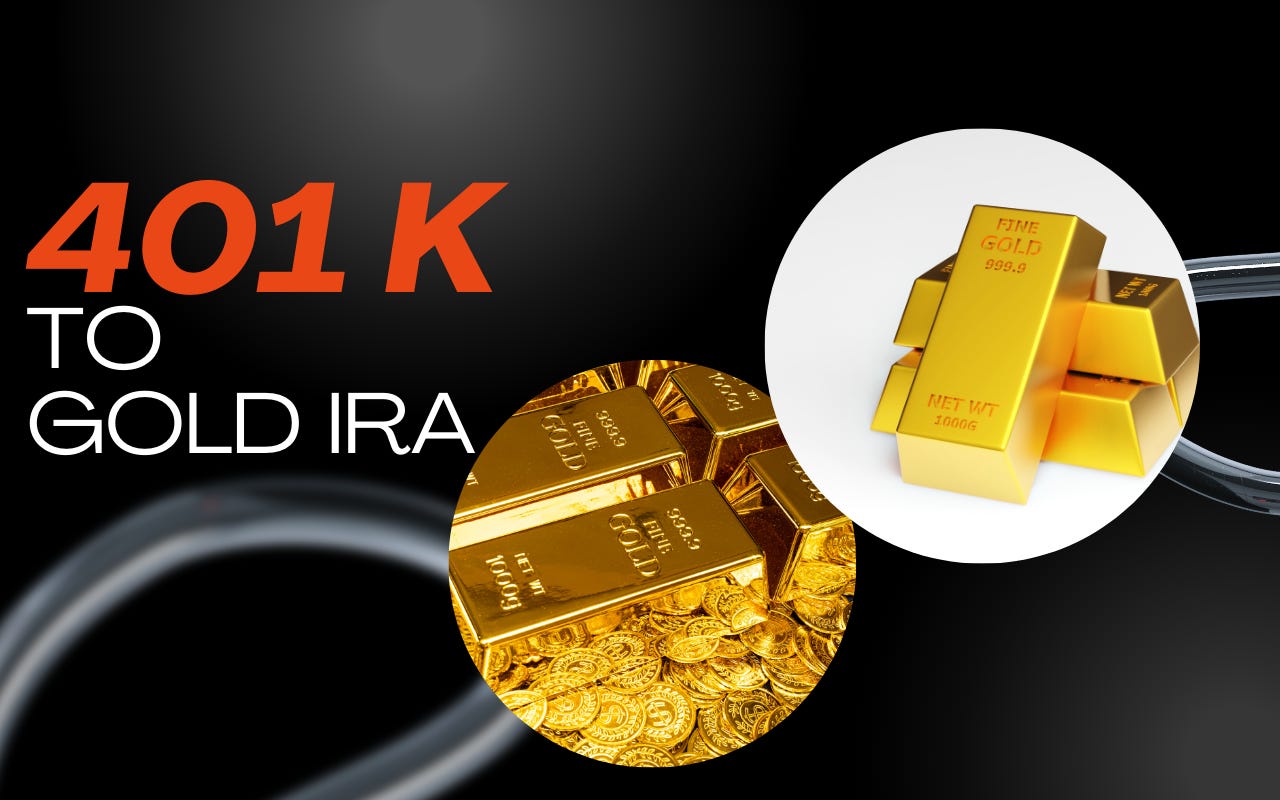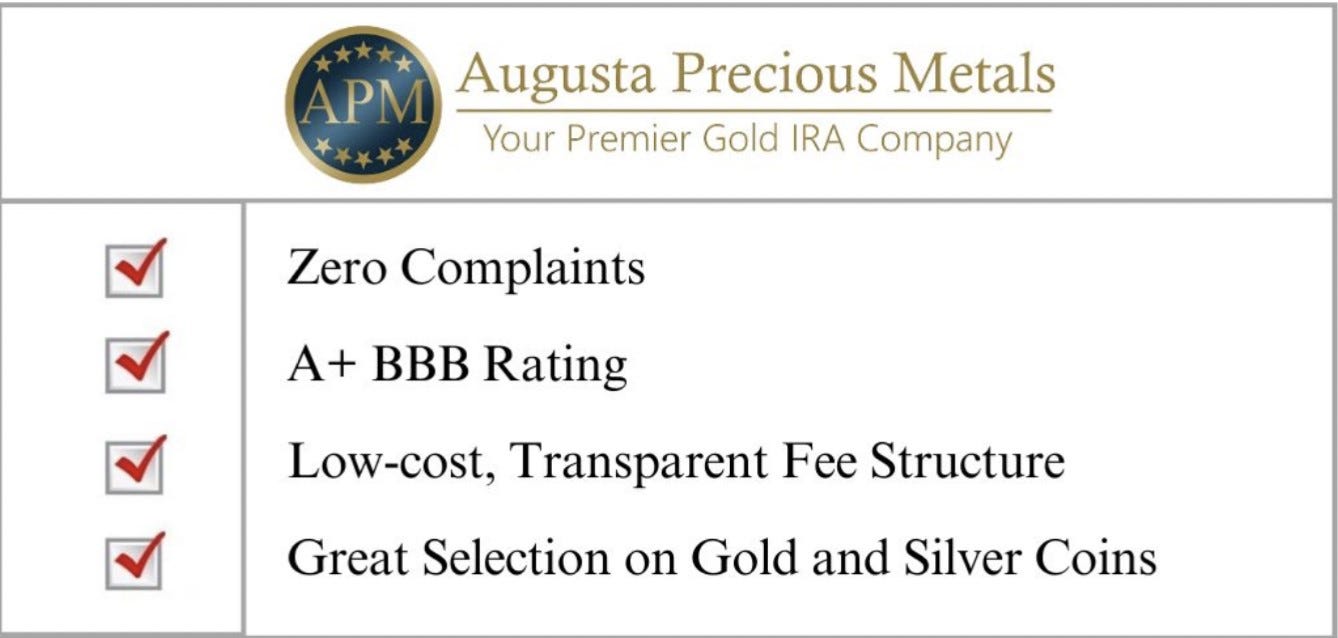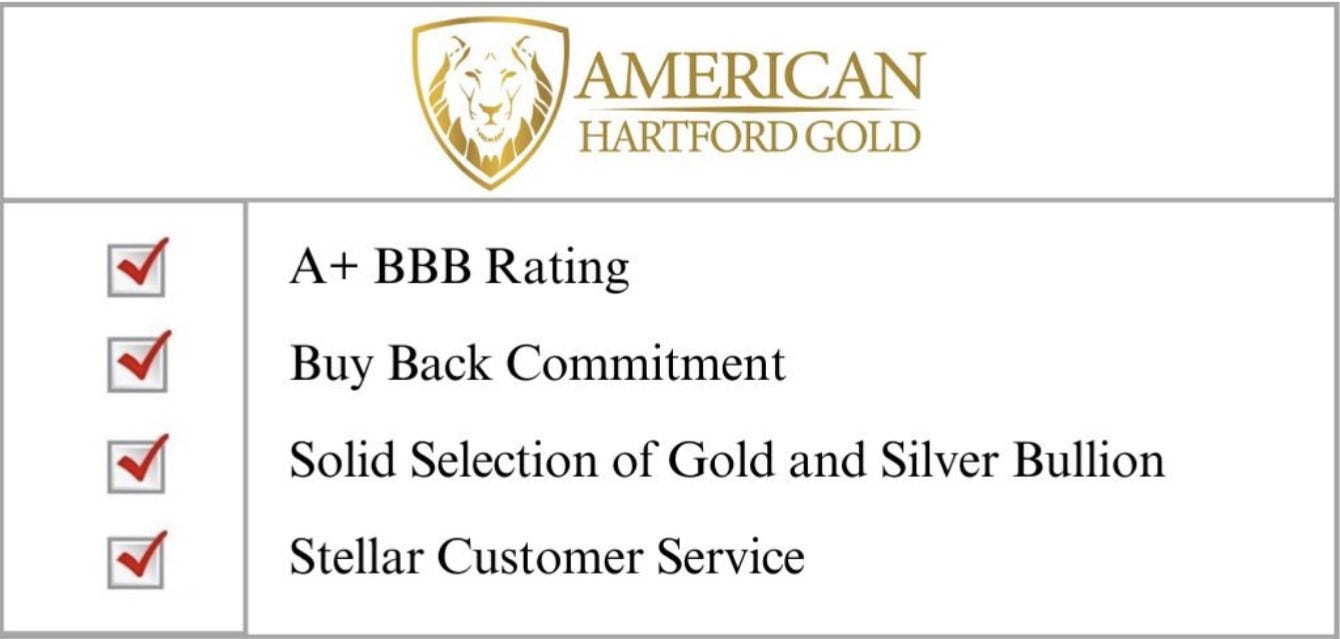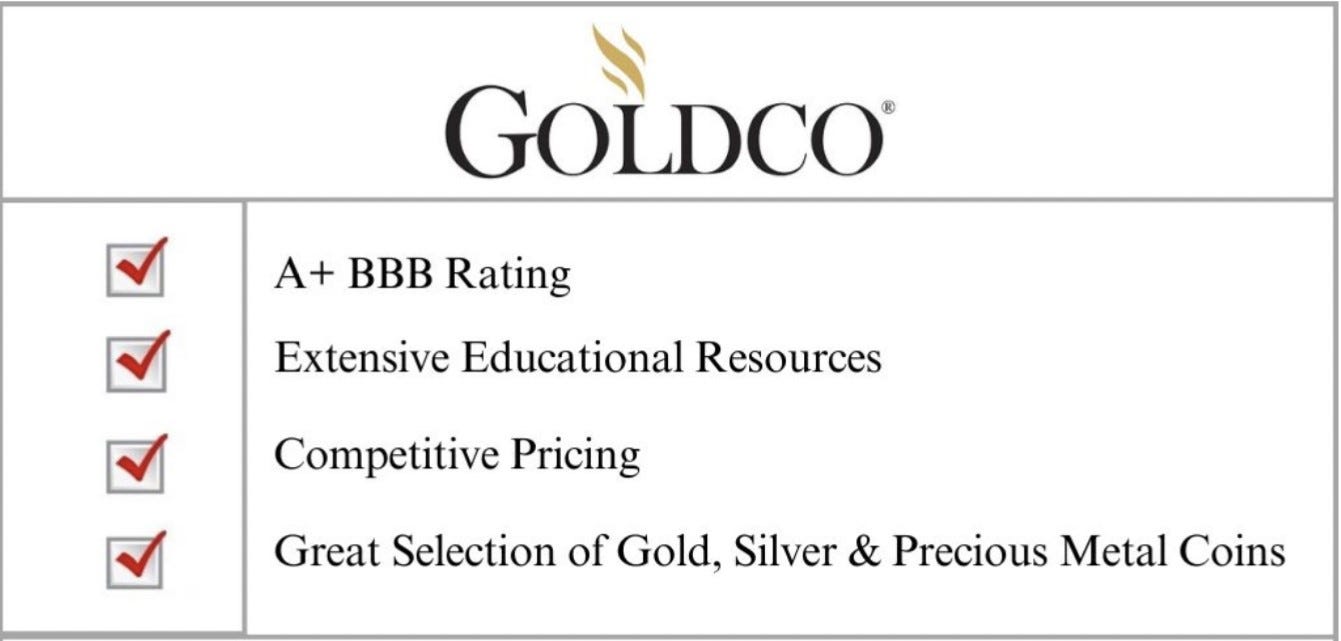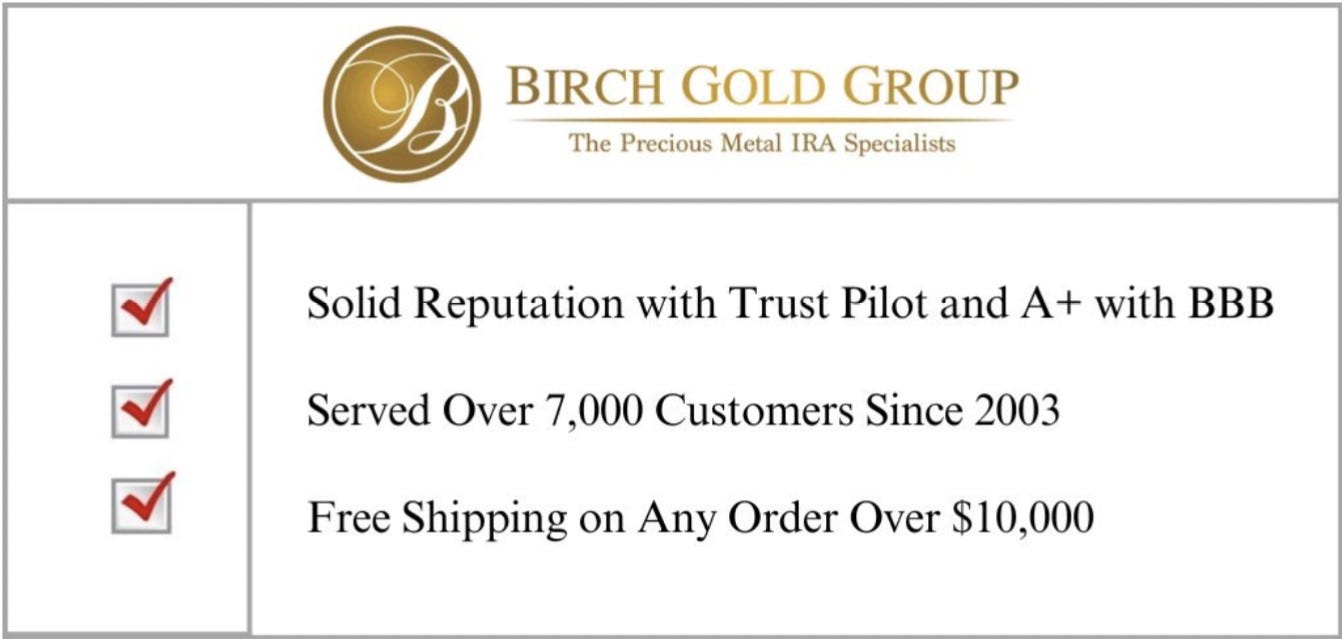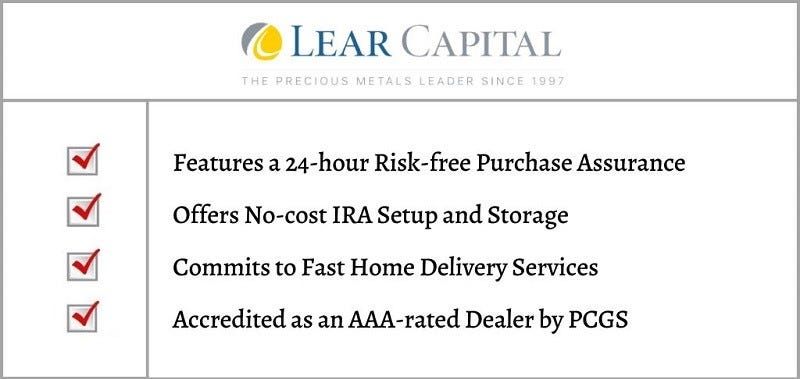401k to Gold IRA Rollover
401k to Gold IRA Rollover
As inflation soars and global economic uncertainties persist, the value of gold and other precious metals as viable alternative investments continues to rise. Gold, in particular, presents a valuable opportunity to diversify one's investment portfolio, reducing the risks tied to traditional investments that have been significantly impacted by recent economic turbulence. Consequently, it’s no surprise that many financial advisors encourage clients to shift funds from their 401(k)s into gold IRAs.
But is this feasible? More importantly, is it possible to transfer funds from a 401(k) into gold without facing penalties? These questions and more will be addressed in detail in the post below.
Best Gold IRA Companies 2024
Augusta Precious Metals: Editor's Choice — Overall Best Gold Investment Company (4.9/5)
American Hartford Gold: Runner Up - Reliable Choice for Gold IRAs (4.8/5)
#1. Augusta Precious Metals: Editor's Choice — Overall Best Gold Investment Company (4.9/5)
>>> Click here to learn more about Augusta Precious Metals <<<
Background:
Founded in 2012, Augusta Precious Metals is a family-owned precious metals dealer based in Beverly Hills, California. The company focuses on helping individuals diversify their retirement savings with gold and silver IRAs. Augusta prides itself on providing high-quality customer service, offering a personal touch with a team of specialists who guide clients through the process. Augusta Precious Metals has built a strong reputation for its transparency, competitive pricing, and educational resources.
Pros:
Exceptional Customer Service: Augusta is known for personalized service with a team of knowledgeable professionals to assist clients.
Educational Resources: Offers webinars, informational kits, and dedicated resources for new investors.
Transparent Pricing: Provides a clear fee structure, avoiding hidden fees, which can be beneficial for those concerned about costs.
Focus on Long-Term Relationships: Aim to support clients throughout the entire IRA setup and beyond.
Cons:
High Minimum Investment Requirement: Requires a minimum investment of $50,000, which may exclude smaller investors.
Limited Product Range: Primarily focuses on gold and silver, with fewer options for other metals or products.
>>> Click here to learn more about Augusta Precious Metals <<<
#2. American Hartford Gold (AHG): Runner Up - Reliable Choice for Gold IRAs (4.8/5)
>>> Click here to learn more about American Hartford Gold <<<
Background:
American Hartford Gold, based in Los Angeles, California, is a family-owned business with a focus on gold and silver IRAs. AHG offers services that make it easy for clients to set up precious metals IRAs, including dedicated support and straightforward options for transferring existing retirement funds. Known for its dedication to customer education, AHG provides resources to help clients make informed investment decisions, including market insights and economic reports.
Pros:
IRA Expertise: Specializes in helping clients establish and manage precious metals IRAs with seamless rollover processes.
Buyback Program: Offers a buyback guarantee, allowing clients to liquidate their assets quickly if needed.
Educational Materials: Provides economic reports and market updates, helping investors stay informed.
Promotions: Often offers promotional deals like waived fees or free silver with qualifying purchases.
Cons:
Limited Product Variety: Primarily focuses on gold and silver, with few other metal options.
Potentially High Fees: Some clients have reported higher fees, especially for IRA services, compared to other companies.
>>> Click here to learn more about American Hartford Gold <<<
#3. Goldco: 100% Transparency (4.6/5)
>>> Click here to learn more about Goldco <<<
Background:
Goldco, founded in 2006 and based in Woodland Hills, California, has become a well-known name in the precious metals industry. Goldco specializes in gold and silver IRAs, offering services that assist clients in transferring or rolling over existing retirement accounts into precious metals-backed IRAs. The company focuses on making the investment process easy and accessible, with dedicated IRA specialists to help clients through each step.
Pros:
IRA Rollovers and Transfers: Known for its smooth and efficient process for establishing gold and silver IRAs.
Highly Rated Customer Service: Positive reviews for knowledgeable and attentive staff.
Promotions and Incentives: Frequently provides incentives such as free silver for new accounts and waivers on some initial fees.
Educational Resources: Offers a free kit and educational materials to help new investors understand the market.
Cons:
High Initial Fees: Goldco’s IRA setup and annual maintenance fees are considered higher than some competitors.
Limited Non-IRA Options: Primarily focuses on IRAs, so options for direct investment may be less robust.
Minimum Investment Requirement: A minimum of $25,000 is typically required for setting up an account.
>>> Click here to learn more about Goldco <<<
#4. Birch Gold: Professional Staff (4.5/5)
>>> Click here to learn more about Birch Gold <<<
Background:
Established in 2003, Birch Gold Group has become a respected name in the gold investment industry, especially known for its gold and silver IRA services. Headquartered in Burbank, California, Birch Gold assists clients in setting up self-directed IRAs to diversify retirement portfolios with precious metals. The company emphasizes education, helping clients understand the benefits of diversifying with precious metals.
Pros:
Experienced in Precious Metals IRAs: Birch Gold has substantial experience with gold and silver IRAs and works with reputable custodians.
Educational Approach: Offers free information kits and consultations, with an emphasis on helping clients understand the benefits of precious metals.
Variety of Precious Metals Options: Offers gold, silver, platinum, and palladium, giving clients flexibility.
Positive Customer Feedback: Generally receives good reviews for transparency and customer service.
Cons:
Potentially High Fees: IRA setup and maintenance fees may be higher than some competitors.
Limited Non-IRA Investment Options: Primarily focuses on IRAs, which may not be ideal for clients looking for direct, non-IRA investments.
Minimum Investment Requirement: Typically requires a minimum of $10,000 for IRAs, which could be a barrier for smaller investors.
>>> Click here to learn more about Birch Gold <<<
#5. Lear Capital: Straightforward System (4/5)
>>> Click here to learn more about Lear Capital <<<
Background:
Founded in 1997, Lear Capital is one of the older precious metals investment companies in the U.S., headquartered in Los Angeles, California. The company offers both IRA and non-IRA options for gold and silver investments. Lear Capital also provides market tracking tools, aiming to make investing more transparent and accessible for new investors. It is well-known for its price match guarantee, which ensures clients get competitive rates.
Pros:
Long-Standing Reputation: Lear Capital’s years of experience in the industry give it credibility and authority.
IRA and Non-IRA Options: Offers flexibility for both retirement accounts and direct purchases of precious metals.
Price Match Guarantee: Ensures clients get competitive pricing by matching prices from other reputable dealers.
Educational Tools: Provides market updates and price tracking to help investors make informed decisions.
Cons:
Complex Fee Structure: Fees are sometimes viewed as confusing, and IRA accounts may have relatively high annual costs.
Mixed Customer Reviews: Although many reviews are positive, some customers have expressed concerns about sales tactics and customer service.
Minimum Investment Requirement: Often requires a minimum of $5,000 for new accounts, which could be restrictive for some.
>>> Click here to learn more about Lear Capital <<<
Understanding 401(k) Plans and Gold Investments
Employers offer employees a 401(k) plan, allowing them to contribute a portion of their salary into a retirement savings account before income tax is deducted. This ensures that employees can consistently save for retirement throughout their careers. Employers may also contribute to the employee’s 401(k) as an incentive, although the IRS regulates such contributions and requires them to remain within set limits. Importantly, funds within a 401(k) grow tax-deferred, meaning taxes are only applied upon withdrawal.
While 401(k) plans offer reliable growth for retirement savings, a gold IRA allows individuals to diversify their portfolio by investing directly in precious metal assets, which hedge against inflation and economic uncertainty.
Systems exist that allow individuals to roll over funds from a 401(k) into a gold IRA, enabling them to purchase precious metal assets as part of their investment strategy. However, the IRS has established specific guidelines to avoid tax penalties when rolling over funds from a 401(k) into a gold IRA. We’ll explore these guidelines further in the following sections.
Why Move Your 401(k) to Gold?
We've discussed the benefits of diversifying assets to manage investment risks, but how does this work specifically with gold? By rolling over part of your 401(k) funds into gold, you can distribute risk across various asset classes, which may help mitigate potential losses during economic downturns.
401(k) funds are typically invested in conventional assets like stocks and bonds. However, when inflation rises, the value of these assets tends to decline significantly, whereas gold often retains its value or even appreciates it. This makes gold a strong hedge against inflation and market volatility, helping investors preserve or grow their retirement savings.
Historically, gold has been regarded as a wealth-preserving asset, providing a buffer against inflation’s erosive effects and helping investors maintain purchasing power. Therefore, investing in gold offers both short- and long-term benefits when held over time.
Steps to Move Your 401(k) to Gold Without Penalty
While investing in gold mutual funds and ETFs is expected in a 401(k), rolling your funds into a gold IRA allows you to own physical gold assets without penalties. Here, we outline the method to complete this rollover successfully.
First, let’s cover the two types of rollovers you can choose from: direct and indirect.
Direct Rollovers
In a direct rollover, the institution managing your 401(k) transfers funds directly into your new gold IRA. For this to occur, the custodian of your gold IRA and your former employer must coordinate to ensure that the funds bypass your account, going straight from your employer’s 401(k) to your gold IRA.
Indirect Rollovers
In an indirect rollover, funds are first withdrawn into your account before being deposited into your gold IRA. This process risks a tax penalty. The IRS does not generally permit retirement account holders to withdraw 401(k) funds into their accounts before retirement age, which incurs a 10% early withdrawal penalty.
However, the IRS grants 60 days to deposit funds into your gold IRA before imposing the penalty. So, if you withdraw funds from your 401(k) into your account, you must transfer them to your gold IRA within 60 days.
The Actual Process
With both types of rollovers in mind, here are the steps to complete the rollover.
Step 1: Set up Your Gold IRA
First, open a gold IRA with a reputable company, like Goldco or Augusta Precious Metals. Ensure the company has a strong reputation, reasonable fees, and a proven track record for gold IRAs. Follow their instructions to set up your account.
Step 2: Choose Your Gold IRA Custodian
A custodian is required to manage your gold IRA until you retire. Use the same criteria you used when selecting your gold IRA company. The custodian will handle your gold assets, oversee storage, and process the rollover. Many gold IRA companies provide a list of custodians for you to choose from.
Step 3: Work With the Custodian to Rollover Your Funds
Once you’ve chosen your custodian, they’ll coordinate with your former employer to release your 401(k) funds. Depending on your preference and the custodian’s guidance, you can select a direct or indirect rollover.
Step 4: Buy Precious Metals
Upon successfully rolling over your funds without penalties, you can use the funds to purchase precious metals through your gold IRA company. This is the final step in moving your 401(k) to gold without incurring penalties.
Legal Considerations and IRS Regulations
As noted, the IRS generally restricts 401(k) funds from being used for alternative investments like gold or other precious metals. Most 401(k) accounts are limited to traditional assets such as stocks, bonds, and mutual funds. Individuals must create a gold IRA and roll over their 401(k) funds into this self-directed account for direct investment in gold.
You can’t purchase physical gold within a standard 401(k). However, many plans provide indirect gold investment options, such as mutual funds or exchange-traded funds (ETFs) that invest in precious metals.
IRS Rules Regarding Gold Ownership in 401(k)s
While most 401(k) plans don’t permit direct precious metal investments, some plans include indirect options aligned with IRS guidelines.
Gold Mutual Funds
Although physical gold investments aren’t typical in 401(k) plans, the IRS allows investment in mutual funds that hold shares in companies within the gold mining industry. This indirect approach offers exposure to gold with the potential for periodic dividends.
Gold ETFs
Certain 401(k) plans with brokerage options allow investments across various asset classes, including gold ETFs. Gold ETFs provide indirect gold ownership by investing in funds that hold physical gold, offering employees a way to access gold indirectly.
Additionally, this brokerage option may permit employees to own shares of individual companies in the gold sector, providing an alternative as close as possible to physical gold ownership without direct possession.
Why Consider a 401(k) to Gold IRA Rollover?
If retirement is approaching, consider rolling your 401(k) into a gold IRA. However, the IRS allows only self-employed individuals or those who have left employment to open a gold IRA or another type of self-directed IRA.
Why is this more advantageous than holding gold mutual funds or ETFs through a 401(k)? While mutual funds and ETFs offer indirect gold access, they don’t allow physical gold ownership or grant control over the gold assets purchased.
With a gold IRA, you select the specific gold coins and bullion to include in your portfolio and can take possession of these assets upon retirement. Therefore, moving funds from your 401(k) into a gold IRA offers greater control and the option to own physical gold, making it a smart choice for those seeking direct ownership of precious metal assets.
Potential Risks and Considerations
Gold can serve as a hedge, but it also carries certain risks. Gold prices can be highly volatile in the short term, so a long-term outlook is critical. Gold doesn’t generate dividends, unlike stocks, so relying on it for income is not feasible. Consider additional costs like custodial and storage fees, which can impact your overall return.
To mitigate these risks, remember that diversification is critical. Avoid putting all your investment funds into gold alone; instead, balance your portfolio across various asset classes to reduce dependency on a single asset.
Choosing the Right Gold Investment
While adding gold to your portfolio is popular, selecting the correct type of gold investment is essential. First and foremost, ensure that the gold you purchase meets the IRS fineness standards. The IRS only allows coins and bullion meeting specific purity levels to be held in a gold IRA; anything that doesn’t meet these standards is classified as a collectible, making it ineligible for a gold IRA's tax advantages. Investing in non-compliant coins risks the tax benefits associated with your gold IRA.
A helpful strategy is to ask your gold IRA provider for a list of IRS-compliant gold coins and bullion to guide your choices.
Final Thoughts
In summary, access to gold through a 401(k) is limited to indirect investments like gold mutual funds or ETFs, which provide exposure to gold but not physical ownership. The only way to directly own physical gold within a retirement account is by rolling over funds from a 401(k) into a gold IRA, which enables you to buy and hold physical gold (coins and bullion).
While the rollover process may take time, it’s worth considering for those looking to diversify and protect against inflation.
>>> Click here to learn more about Augusta Precious Metals <<<




